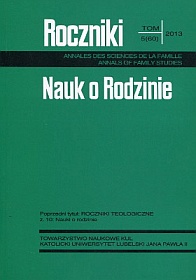Famille, éducation et école
Abstrakt
Rodzina, kształcenie i szkoła
Od końca drugiej wojny światowej ewolucja rodziny przybrała dramatycznie inny kształt. To samo dotyczy realiów szkoły i jej podejścia do nauczania. Czy jednak potrzeba nauczania może być ograniczana i wyrażana poza realnym życiem? Żądanie zmian jest powszechne zarówno wśród młodych, jak i dorosłych, którzy poszukują rzeczywistych odpowiedzi na swoje pytania. Uczenie się przez całe życie staje się rzeczywistością: jest to nauczanie dla życia! Można potencjalnie uzyskać w tej kwestii rozmaite odpowiedzi. Jedną z nich są Wiejskie Domy Rodzinne (MFR – Maisons Familiales Rurales), należące do AIMFR, Międzynarodowego Związku Wiejskich Domów Rodzinnych.
Bibliografia
Achenbach T. M., Howell C. T.: Are American Children's Problems Getting Worse? A 13-Year Comparison, “Journal of the American Academy of Child & Adolescent Psychiatry” 32(1993), p. 1145-1154.
Adriaenssens P.: Opvoeden is een groeiproces, Tielt: Lannoo 1995.
Baumrind D.: Authoritarian versus Authoritative Parents Control, “Adolescence” 3(1968), p. 255-272.
Bennis W. G., Benne K. D., Chin R. (Eds.): The Planning of Change. Readings in Applied Behavioral Sciences, New York: Holt 1962.
Daigney J. C.: Dans Ensemble construisons notre avenir. Actes du XXVe Congrès de l'AIMFR, Bruxelles, 22-23 novembre 2000, p. 97-103.
Depaepe M., Simon F.: Dans Ensemble construisons notre avenir. Actes du XXVe Congrès de l'AIMFR, Bruxelles, 22-23 novembre 2000, p. 86-97.
Dewey J.: Experience and Education, London: Collier-Macmillan 1938.
Dooghe J., Vanderleyden L.: Population et Opinion Publique, Anvers, édition néerlandophone 1974.
Dumon W. A.: Femme et Famille. Quelques recherches au niveau de la sociologie de la famille en relation avec la problématique féminine, Leuven: Institut de Recherche Sociologique 1975.
Glenn N. D.: A Plea for Objective Assessment of the Notion of Family Decline, “Journal of Marriage and the Family” 55(1993), p. 542-544.
Heylen V. [et autres]: Déficits du mariage et du divorce. Leuven: Presse Universitaire 1972.
Hinderyckx H., van Neervenne A.: Famille contre famille. Anvers, édition néerlandophone 1972.
Illich I.: Deschooling Society, Publication du “Center for International Documentation (CDOC)”, 1973.
Jansen T., Klercq J.: Experiential Learning and Modernity, [w:] D.Wildemeersch, T. Jansen (Eds.), Adult Education, Experiential Learning and Social Change: The Postmodern Challenge's-Gravenhage: VUGA Uitgeverij B.V. 1992, p. 93-104.
Kolb D. A.: Experiential Learning: Experience as the Source of Learning and Development, Engelwood Cliffs: Prentice Hall 1984.
Leirman W.: Vier culturen van educatie: expert, ingenieur, profeet, communicator, Garant, Leuven/Apeldoorn 1993.
Maccoby E. E.: The Role of Parents in the Socialization of Children, ”Developmental Psychology” 28(1992), nr 6, p. 1006-1017.
Nove-Josserand F.: L'étonnante histoire des Maisons Familiales Rurales, Editions France-Empire 1987.
Rutter M.: Psychosocial Resilience and Protective Mechanism, “American Journal of Orthopsychiatry” 57(1987), p. 316-331.
Vervaecke G. [et al.]: Kan permanente vorming bijdragen tot hoop? [w:] B.Pattyn [et al.] (Eds.),] Wegen van Hoop. Universitaire perspectieven. Leuven: Universitaire Pers Leuven 1995, p. 203-210.

